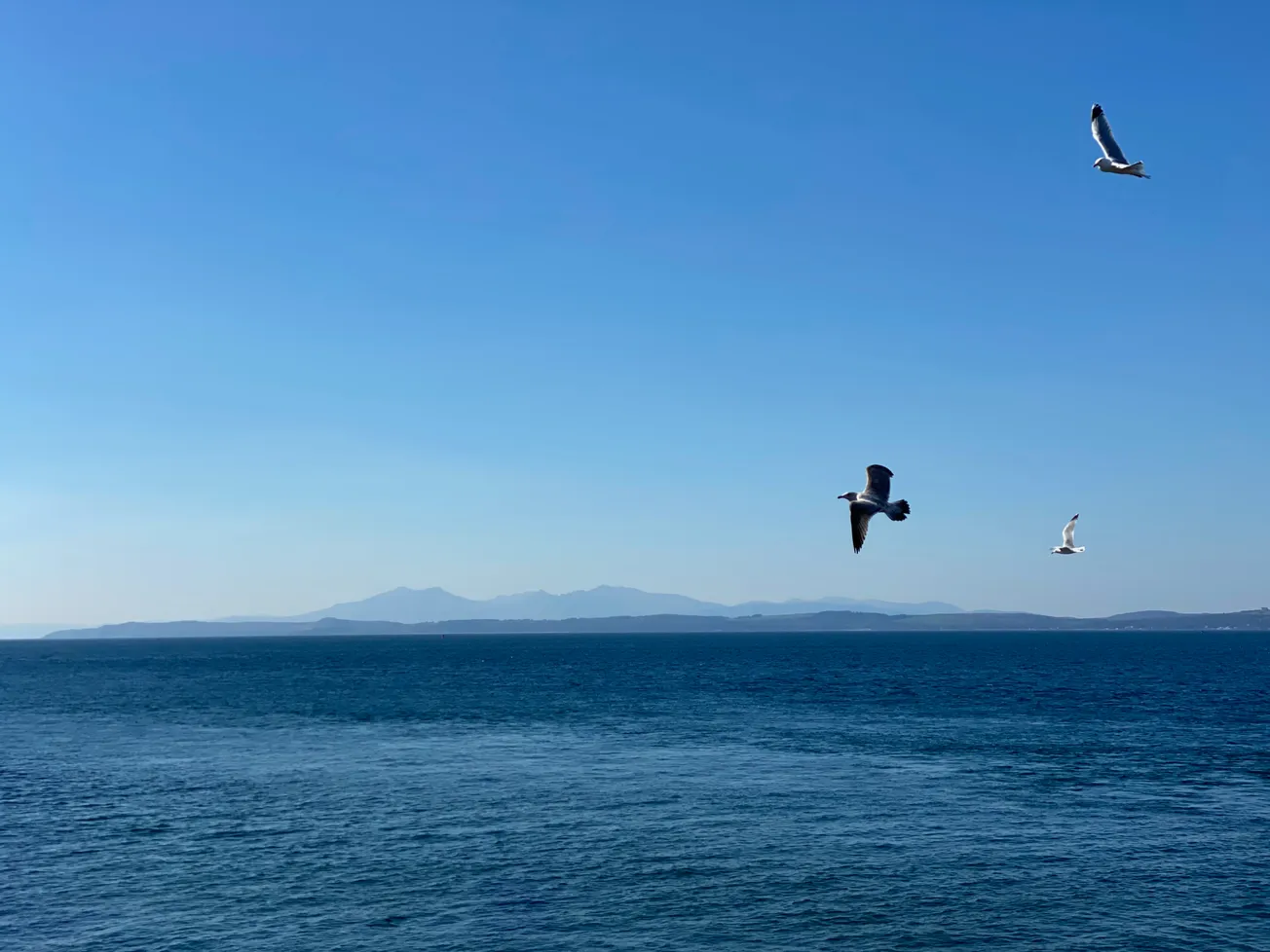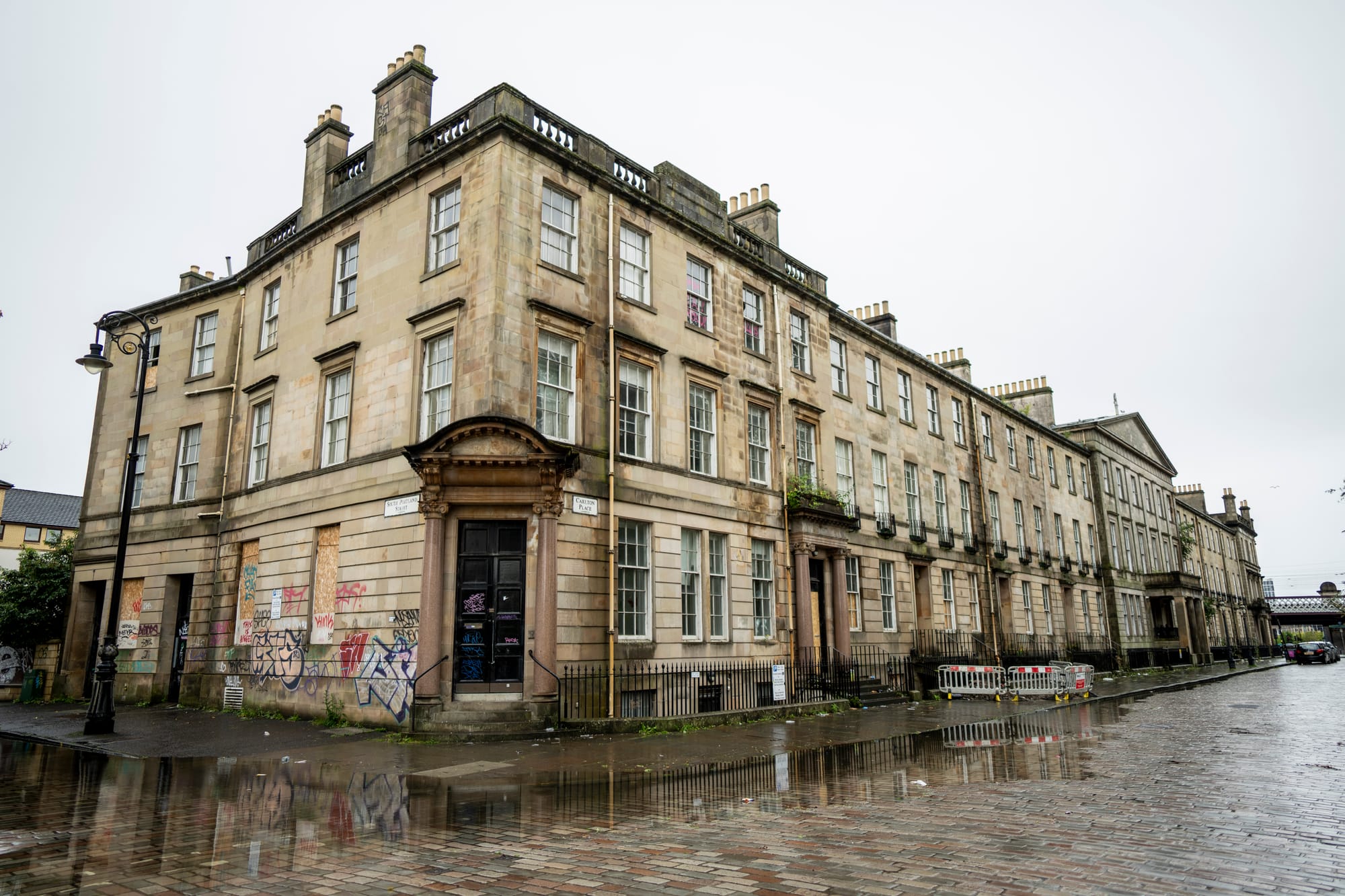Morning readers, and congratulations for surviving January.
Over the weekend, we published our profile of viral YouTubers The Streets Glasgow, which a Bluesky user described as “a fascinating, if troubling read”. A clear source of tension that emerged in the piece was the housing crisis, which Glasgow officially declared at the end of 2023. We’ll come back to a proposed solution to the accommodation shortage in today’s big story.
While we only spent an afternoon with The Streets’ Francis and Aldo, cutting about the city centre and seeing the work they do, it’s a story we’ve been researching for months. It sounds clichéd, but we couldn’t do this sort of journalism without you, especially our paid supporters.
On that note, a massive thanks to the scores of folks who signed up following our appeal over the weekend. We’re feeling quietly confident about hitting that spring target of 500. (That’s the spring equinox on 20 March, rather than Imbolc, or Celtic spring, which the pagan-inclined among you marked over the weekend).
As if to drive home the point we made in our appeal yesterday, an interview with Reach CEO, the Glaswegian Jim Mullen, revealed that one of his regional journalists published 106 articles on Friday. Needless to say, we’re trying to do something different here, and we need your support.
To emphasise our investment in this kind of journalism, a big reminder that we’re hiring a new Glasgow-based reporter for The Bell. If you know this city like the back of your hand and are a tenacious journalist who loves to pick up the phone, we want to hear from you. Salary is up to £30,000, dependent on experience and there’s an application deadline of 21 February. Find more details here.
Now: time for your Monday briefing.
Your Bell briefing
✈️ A Glasgow ‘tourist tax’ is one step closer to becoming a reality, as councillors are being asked to greenlight a formal public consultation on the proposal this Thursday. The plans concern the implementation of a 5% levy on overnight stays, which could raise a projected £11m a year. But some trade bodies are warning the tax may dissuade tourists from visiting the city, concerns which council treasurer, Ricky Bell — the levy’s biggest champion — has dismissed. “Research by the Scottish Government and Edinburgh University both conclude that there’s no evidence to suggest that a visitor levy will reduce visitor numbers,” he said. “People are accustomed to paying similar levies in other countries, and they don’t seem to mind.” True; but tourists get a lot more sunshine for their levy in the Caribbean…
🗳️ Glasgow North East will get its second by-election in four months after councillor Mary McNab resigned, amid a lengthy legal battle over whether she should have been disqualified from taking her seat. In November 2024, McNab was elected to represent Labour for the ward, but failed to follow rules about stepping down from her job as a council official and was subsequently barred from serving as a councillor. The delay, reports The Herald, was because McNab had “negotiated an early retirement settlement and was concerned about potentially losing her so-called golden goodbye”. Labour initially fought the city council’s decision to block McNab’s role but last week came to an agreement to dismiss the case and for McNab to submit her notice. Even with the resolution, Labour are still blaming the council for the “administrative error” — quite the cheeky spin, if we say so ourselves.
🎨 Glasgow’s Centre for Contemporary Arts will re-open in April after receiving a new multi-year funding deal from Creative Scotland. The gallery and arts space announced its temporary closure in September last year, shuttering its doors at the end of December, after knock-on delays from the Westminster and Scottish governments meant Creative Scotland pushed back funding allocation decisions until January. While the CCA now has a three-year reprieve — and at the risk of sounding too gloomy — the problems dogging Glasgow’s arts funding structures have not disappeared. Three years at the drawing board to also innovate some alternative financial solutions, perhaps …
Big story: Glasgow council trials a new penpal strategy to tackle the housing crisis
Topline: Glasgow City Council are asking owners of vacant homes to sell or rent their properties, in a bid to combat a growing housing crisis.
Lights aren’t on, no one’s home: Amid a supposed housing shortage, the council are getting personal. City housing convenor Ruairi Kelly is pursuing a new epistolary policy: sending out missives to the owners of more than 2,500 homes currently lying empty in Glasgow, pleading with them to either sell or rent out their properties.
What’s the goal? To get some movement on the vacant homes. There’s currently 7,000 homeless applications and more than 4,000 households in temporary accommodation, council figures show. As housebuilding lags — with new social housing particularly slow to materialise — the council are looking to other options, such as existing unused stock.
- Kelly framed this latest effort as a “moral responsibility”, saying in a statement that: “I've got an obligation to pursue any resource I can that might increase the supply of housing in the city. Addressing the thousands of vacant properties in Glasgow could be one of the quickest and most cost-effective ways of making a major impact.”
Carrot not stick: The council appeal is not just to the conscience of home owners. The authority says they will be offering letter recipients practical support, such as connecting owners with charities that “are expert in letting property to alleviate homelessness”, or assistance in accessing VAT and merchants discounts that could assist with the cost of repairs or renovation.
- Kelly told The Bell that lots of Glasgow’s empty homes aren’t purposefully kept vacant. “Many will be due to contested wills, insufficient funds to renovate or owners inheriting a property in an area they don't live in and are unsure what to do next. That's why I want them to get in touch so we can support them and bring additional properties to the market in the quickest and most cost effective way,” he said.
What’s the backdrop? Glasgow has a housing crisis, but is it a general shortage per se, or a shortage of affordable accommodation? Itinerant student populations have put more pressure on housing but a push on purpose-built student accommodation (also favoured by developers) means that the city looks set to have a surplus of such property within a few years.
Meanwhile, data from Citylets suggests private rental property prices are still on the rise. In 2022, the average rent for a two-bed in Glasgow was £999; in the last quarter of 2024, this had increased by 19% to £1,192.
- Citylets also report that one-bedroom properties are the city’s most in-demand, because of Glasgow’s cohort of young professionals. Changes in the way people live is a huge factor in creating a housing crisis; while Glasgow’s population has actually declined by around 450,000 since a peak of over a million in the mid-20th Century, more people now want to live alone, or in smaller households.
- In addition, four-bedroom properties have seen huge increases in cost: a 106% jump in 10 years. Citylets say this demonstrates Glasgow's “strength of investment potential [...] for landlords choosing to develop a property portfolio in the city”. Sounds like pricing out families to us…
Bottom line: Bringing existing properties back into the housing mix will hopefully relieve some pressure on Glasgow’s strained market. But it’s only half the battle: making sure such stock is affordable, and answers the demands of those who need housing, is the other.
Spot of the week - Mosob, Dundas Street
Glasgow is pretty blessed when it comes to restaurants where you can gobble down injera, the spongy flatbread that’s a staple in Ethiopia and Eritrea. One particularly nice spot to do so is Mosob, a charming first floor Ethiopian eatery tucked away behind Queen’s Street station. Its facade is unassuming but inside, a large, welcoming space awaits. Great for dates, mates and visiting relatives. While you can’t go wrong with a sharing platter, Mosob’s sambusas (the East African iteration of a samosa) and Berbere french fries are particular stand outs. A charismatic waiter will also do his best to upsell you the house beer; accept this recommendation gratefully.
Media picks
Win some, loose some: BBC Radio 4’s Loose Ends was in Glasgow on Saturday for the penultimate day of Celtic Connections. Alongside Mhairi Black, who’s embarked on a post-Westminster comedy career, was cameraman Gordon Buchanan, actor Cal MacAninch and Edinburgh’s Makar Michael Pedersen.
Glasgow’s greatest scar: Herald features writer Mark Smith interviewed one of the original protesters of the M8 motorway from 1972 in a piece about the future of Junction 18, known as the ‘Charing Cross canyon’. The most illuminating part of the article, however, was the response from Glasgow City Council. A spokesperson said it was “very hard to demonstrate positive economic benefit” to “justify the price tag” of any of the proposals to cap-and-cover the city centre sections — appearing to kibosh the lofty goals of the Replace the M8 campaign, for now at least. The price of those proposals? Anywhere between £50–£80m. Repairs to the Woodside Viaduct alone, meanwhile, are set to cost anywhere between £126m–£152m.
Furry not: The Scotiacon furry convention comes to Glasgow this weekend. (Short, very simplified furry definition: people who assume the persona — or fursona — of an animal, which can also involve dressing up in costumes. There is sometimes — ok, often — a sexual element to this). Scotiacon 2025 has caused some consternation in the pages of The Times and The Sunday Post, the latter characterising it as an example of “woke gone wild”. Both are attempting to stir up the culture war, owing to the Scotiacon code of conduct stating that harassment of any kind will not be tolerated, including that related to “fandom specific characteristics such as the maker of an individual's fursuit or the species of someone's fursona”. Scotiacon Scotland has taken place since 2011 though, predating current ‘woke’ bashing by several years.
Things to do
Tuesday
The Glasgow Museum Resource Centre opens its doors to the public for a specialist tour tomorrow, on its ‘Arms and Armour’ collection. Tickets are limited to 15, but if you’re too late they run weekly public tours on Wednesdays. Info here.
Wednesday
Glasgow Science Centre is playing host to some rock legends — on the big screen at least. Bernard MacMahon’s account of the meteoric rise of Led Zeppelin has been eagerly awaited since its work-in-progress screening at the Venice Film Festival four years ago. Now it’s finished and you can catch evening IMAX previews before its wide release on 7 February. Tickets from £11.55.
Thursday
‘Tours of Scotland’ presenter Paul Murton brings his exploratory oratory to the Renfield Centre, with an afternoon talk examining some of Europe’s most remote islands. Tickets from £5.
Friday
Leeds’ Bakey is back in town, this time for a three-hour set at Stereo. Get ready for his take on UK Soundsystem music, with bootlegs and soundcloud edits in place of white labels, and a wide-ranging set spanning 2-step, bassline, jungle, speed garage and grime. Tickets from £17.70.
Saturday
A ceasefire may be in place, but scores of questions still surround the future of a destroyed Gaza, and wider Palestine. Political analyst Sami Hamdi leads a panel at the C7 Conference Centre, attempting to explore what’s next for the territory — and dispel feelings of hopelessness. Tickets from £5.
Comments
How to comment:
If you are already a member,
click here to sign in
and leave a comment.
If you aren't a member,
sign up here
to be able to leave a comment.
To add your photo, click here to create a profile on Gravatar.






